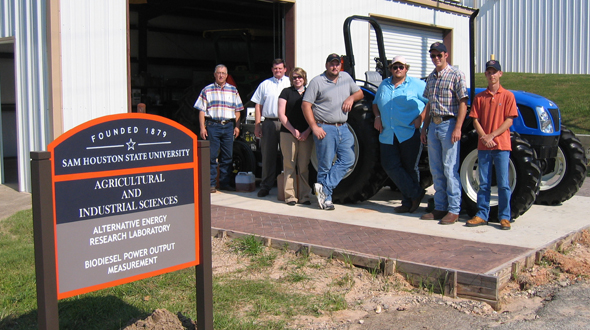SHSU Students Conduct Biofuels Research
 |
| Sam Houston State University's Biodiesel
Power Output Measurement Team outside the group's new home,
with their donated $32,000 New Holland tractor, include,
from left: Joe Muller, associate professor of agriculture;
Doug Kingman, assistant professor of agriculture; Jennifer
Largent, graduate animal sciences major from Neches; Chase
Kizziah, senior agricultural mechanics major from Richmond;
Justin Rogers, senior agricultural mechanics major from Normangee;
Jordan Kiker, senior agricultural mechanics major from Winnie;
and Corey Brown, senior agricultural mechanics major from
Palestine. |
The questions concerning our fuels of the future are many, but
a group of agriculture students at Sam Houston State University
are helping provide some of the answers.
Led by agriculture
professors Doug Kingman and Joe Muller, a five-student team is
working in the Department of Agricultural and Industrial Sciences'
new Alternative Energy Research Laboratory located in the Holleman
Field area of the campus.
Inside the
lab is a shiny blue $32,000 tractor furnished by the New Holland
company and a $23,000 dynamometer that is hooked up to the
tractor to measure its performance on various biodiesel mixtures.
When Rudolph
Diesel built an engine in Germany in 1893 it ran first on peanut
oil, and he believed fuel made from plants was the real
future of his engine. Appropriately, SHSU senior agriculture
mechanics major Jordan Kiker last year began testing an older
tractor using peanut oil.
Kiker grew
up on a rice and soybean farm near Winnie, Texas, and has been
around tractors all his life. He credits Kingman, who had been
doing biodiesel testing at Illinois State for four years before
coming to SHSU a year ago, with peaking his interest.
"The oil
used in one of the first demonstrations was left over vegetable
oil from a fish fry that the Agricultural Mechanics Club had
put on," said Kiker. "The only treatment the oil had
was it being strained through a patch of blue jean denim."
Kiker made
a minor modification to an old Ford tractor and it ran. He has
since learned lots about biodiesel and Kingman believes he has
an aptitude for research in this area that could eventually lead
to his doctorate.
"Oils
like soybean, cotton seed, and sunflower are becoming more plentiful," said
Kiker, explaining that peanut oil is more expensive because of
the short supply.
"There
are a few exotic plants that yield the most oil in pounds per
acre," he said. "These include the palm which produces
palm oil and the jatropha curcas plant, which are not yet grown
in America."
Other issues relating to possible increased use of diesel
fuel made from plants include the fact that the biodiesel
produces less carbon dioxide, which is better for the greenhouse
effect, but more particulates, which is worse for smog.
How much energy
it takes in such forms as tractor fuel and fertilizer to produce
a certain amount of biodiesel, is another issue, as well as environmentalists'
concerns that if biodiesel production is accelerated more forests
will be cleared for cropland, producing other problems.
An entire segment
of the current research, for instance, is concerned with algaculture,
or the production of biodiesel from algae ponds at wastewater
treatment plants. This process would not require agriculture
production energy or destruction of forests.
The SHSU group
is working on a small segment of the overall problem, but one
that could be valuable even in the short term to farmers.
"The focus
of our research has revolved around the desire to determine if
several biodiesel blends generate more horsepower than the traditional
No. 2 diesel made from crude petroleum," said Kingman.
"Results
of our tests so far indicate that B5, a blend of 5 percent pure
soybean oil and traditional diesel, slightly outperform the other
biodiesel/diesel combinations."
In addition
to power output measurement, the consumption of each fuel was
determined while the tractor was under heavy and light loads.
Future testing will include 100 percent biodiesel made from cotton
seed, by-products of animal processing, and sunflowers.
In addition
to Kingman, Muller and Kiker, other members of the team include
Jennifer Largent, graduate animal science major from Neches;
Chase Kizziah, senior agricultural mechanics major from Richmond;
Justin Rogers, senior agricultural mechanics major from Normangee,
and Corey Brown, senior agricultural mechanics major from Palestine.
Members of
the team including Kingman, Muller, Brown, Kiker and Kizziah
were recently invited by Todd Staples, Texas Commissioner of
Agriculture, to participate in a Fort Worth celebration marking
the 100th Anniversary of the Texas Department of Agriculture.
The real celebration,
they say, will come when there are more answers to the many questions
relating to the production and use of fuels from plants.
—END—
SHSU Media Contact: Frank Krystyniak
Sept. 27, 2007
Please send comments, corrections, news tips to Today@Sam.edu.
|


